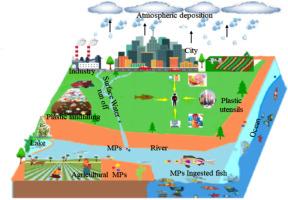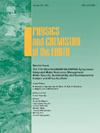评估微塑料流行病:亚洲水生环境中的普遍性、检测和对人类健康的影响
IF 3
3区 地球科学
Q2 GEOSCIENCES, MULTIDISCIPLINARY
引用次数: 0
摘要
微塑料污染日益严重,对生物群和人类产生了令人担忧的影响,对全球构成了重大威胁。目前,每个陆地和海洋区域都受到微塑料污染的不同影响。污染最严重的地区是工业化大都市地区和有大量人类活动的沿海地区。在这项研究中,我们选择了具有代表性的淡水样本、海洋样本、水中生物群样本以及沉积物样本,这些样本的微塑料污染程度不同,地理条件也各不相同。针对各自选择的水域和基质,我们回顾、评估并总结了当前的微塑料污染情况和各种微塑料污染评估方法。在亚洲收集的数据中发现,印度孟买海岸的水和沉积物中微塑料的浓度最高,分别为 372 ± 14.3 微克/升和 9630 ± 2947 微克/千克。这种巨大的丰度可能是由于沿海地区附近的人类活动以及移民和旅游业造成的。这也可能是由于污水排放和未经处理的生活废水被倾倒到环境中造成的。摄入微塑料颗粒会使人类面临细胞毒性、超敏反应、不必要的免疫反应以及急性反应(如溶血、自身免疫疾病、癌症和神经系统疾病)的风险。针对从淡水到海洋的微塑料污染现状和潜在的缓解途径,我们比较了微塑料在不同地点的分布和重要特征。这项研究促使研究人员重视减少亚洲等人口密集地区的微塑料污染。本文章由计算机程序翻译,如有差异,请以英文原文为准。

Assessing the microplastic pandemic: Prevalence, detection, and human health impacts in Asian aquatic environments
Microplastics pose a major threat to the globe due to their increased pollution and concerning effects on biota and humans. Presently, every terrestrial and marine region is affected diversely by microplastic contamination. The most polluted locations are industrialized metropolitan areas and coastal regions with considerable human activity. In this study, we choose representative samples of freshwater, marine, and biota in water, as well as sediments with different levels of microplastic pollution and distinct geographical conditions. For individually chosen aquatic areas and matrices, we reviewed, assessed, and summarised the current microplastic pollution and various methods of microplastic pollution assessment. The highest concentration of microplastics in data collected in Asia was found to be 372 ± 14.3 item/L and 9630 ± 2947 item/kg in the water and sediments of the Mumbai, India, coast. This huge abundance might be generated by human activities near the coastal areas as well as due to migration and tourism. This could also be due to sewage discharge and untreated domestic wastewater that is being dumped into the environment. Consuming of microplastic particles can put humans at risk for cytotoxicity, hypersensitivity, an unwanted immune response, and acute responses such as haemolysis, autoimmune diseases, cancer, and neurological conditions. Focusing on pollution status and potential mitigation path for microplastics from freshwater to oceans, we compared the distribution and important characteristics of microplastics in different locations. This study leads researchers to emphasis the reduction of MP pollution in densely populated areas like Asia.
求助全文
通过发布文献求助,成功后即可免费获取论文全文。
去求助
来源期刊

Physics and Chemistry of the Earth
地学-地球科学综合
CiteScore
5.40
自引率
2.70%
发文量
176
审稿时长
31.6 weeks
期刊介绍:
Physics and Chemistry of the Earth is an international interdisciplinary journal for the rapid publication of collections of refereed communications in separate thematic issues, either stemming from scientific meetings, or, especially compiled for the occasion. There is no restriction on the length of articles published in the journal. Physics and Chemistry of the Earth incorporates the separate Parts A, B and C which existed until the end of 2001.
Please note: the Editors are unable to consider submissions that are not invited or linked to a thematic issue. Please do not submit unsolicited papers.
The journal covers the following subject areas:
-Solid Earth and Geodesy:
(geology, geochemistry, tectonophysics, seismology, volcanology, palaeomagnetism and rock magnetism, electromagnetism and potential fields, marine and environmental geosciences as well as geodesy).
-Hydrology, Oceans and Atmosphere:
(hydrology and water resources research, engineering and management, oceanography and oceanic chemistry, shelf, sea, lake and river sciences, meteorology and atmospheric sciences incl. chemistry as well as climatology and glaciology).
-Solar-Terrestrial and Planetary Science:
(solar, heliospheric and solar-planetary sciences, geology, geophysics and atmospheric sciences of planets, satellites and small bodies as well as cosmochemistry and exobiology).
 求助内容:
求助内容: 应助结果提醒方式:
应助结果提醒方式:


